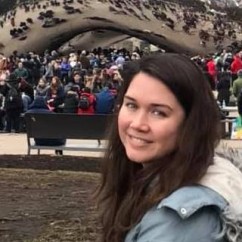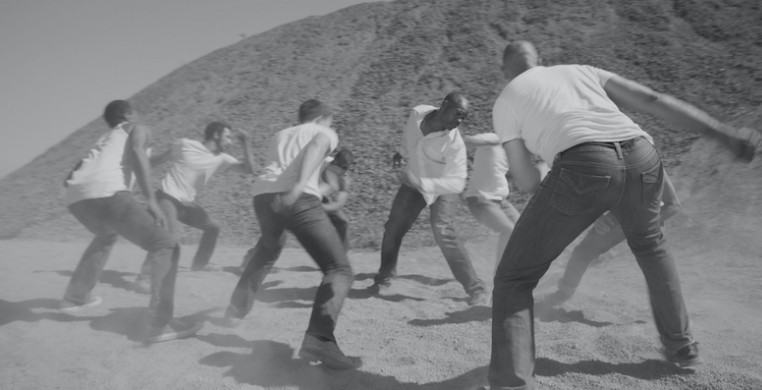“It’s been so important for me to consider progress, no matter how small, no matter how long it takes. Less about the specific point I’m at and more about the rate of change. Honoring the distance covered over time, the velocity of my being. And just needing to force myself to do shit. Trying over and over [...] when the default state of mind is the debilitating who-even-gives-a-fuck lack of motivation.”
Tom Tsai’s opening words overlay painstaking slow-motion break dance in his film “About Inertia,” one of 10 selected shorts for the USA Dance on Screen platform that’s a part of this year’s (now digital) JOMBA! Contemporary Dance Festival in South Africa. In Tsai’s words I immediately recognize the resilience dance artists have always had to embody from their under-funded, under-appreciated position in the wider arts field. I marvel at the impossibility of his movements—a series of head and arm balances with legs crossed and tucked in precarious shapes— in contrast to his gentle, poetic voice. He reminds me that nothing great has ever been achieved quickly or easily, but rather over time with consistency.
Another stand-out was Aimie Dowling and Austin Forbord’s “Separate Sentences,” which explored the generational impact of incarceration on families and communities. The cast consisted of an intergenerational, interracial group of 19 men who either had been or were related to someone incarcerated. Shot mostly in black and white, this abstract narrative centers a young Black boy traversing the path laid before him leading inevitably, it would seem, toward prison or death. Composer Albert Mathias samples familiar worksongs for the film’s score, which remind me of Donald McKayle’s 1953 masterpiece similarly portraying life on a prison chain gang, “Rainbow Round My Shoulder.” Now, nearly 70 years later, the connection between slavery and incarceration in the U.S. is as present as ever.
Too often I fall into that debilitating sense of defeat Tsai describes, especially when I imagine the monumental challenges of building a more just world, but Tsai reminds me that it takes practice. That stamina must be built, and we must honor the distance covered over time without ever giving up. Dowling and Forbord’s film also offers us light at its close. In a final vignette, a chaotic brawl slowly morphs into a moment of reckoning, a loving embrace, a break in the spiral of neglect and miseducation that assists our country’s racist incarceration system.
Co-curated by Lauren Warnecke, Tara Aisha Willis, Peter Chu and Rachel Miller, the 10 films on this platform represent the wide-range of dance genres, lineages, socio-political perspectives and geographies in the U.S., posing opportunities for its audience to practice shifting habitual thoughts on identity, history, experimentation and what dance is and can be. While I long to encounter the live exchange between artist and audience once again, I am thankful for this long-distance engagement with South Africa, as it reminds me of both how far we’ve come and how far we have yet to go.
--
The USA Dance on Screen platform, part of the 22nd JOMBA! Contemporary Dance Experience, airs on Youtube Live once more Sept. 6 at noon CST. To learn more visit www.jomba.ukzn.ac.za.
This piece was produced as part of the inaugural See Chicago Dance Critical Writing Fellowship, in partnership with JOMBA! Contemporary Dance Experience and the University of KwaZulu-Natal (Durban, South Africa), the University of the Witwatersrand and The Ar(t)chive (Johannesburg, South Africa) and the University of East London (London, UK). Financial support is provided by the U.S. Consulate in Durban, the National Endowment for the Arts and the Chicago Department of Cultural Affairs and Special Events.

Fellow Laura Paige Kyber is a curatorial assistant working in performance and public practice at the Museum of Contemporary Art Chicago. She recently received her master’s degree from Wesleyan University’s Institute for Curatorial Practice in Performance, where her research explored ethical strategies of care in curatorial relations with artists, audiences, and institutions. Prior to joining the MCA she was the research associate at the Maggie Allesee National Center for Choreography at Florida State University, a grant funded position that supported creative development residencies for dance artists. She has also held positions with the Pew Center for Art and Heritage in Philadelphia, and Jacob's Pillow Dance Festival in Becket, Massachusetts, where she curated the outdoor dance series, Inside/Out.
Disclosures: SCD editor Lauren Warnecke was a co-curator of USA Dance on Screen. Tara Aisha Willis, also a curator of this program, is associate curator of performance at the MCA, where the author is employed.

